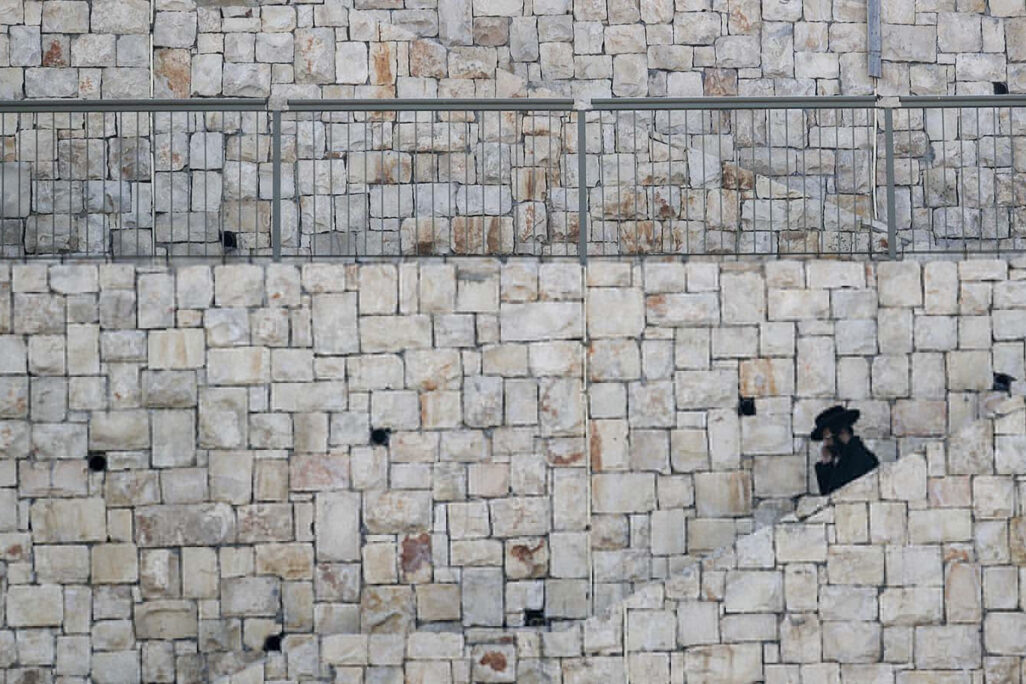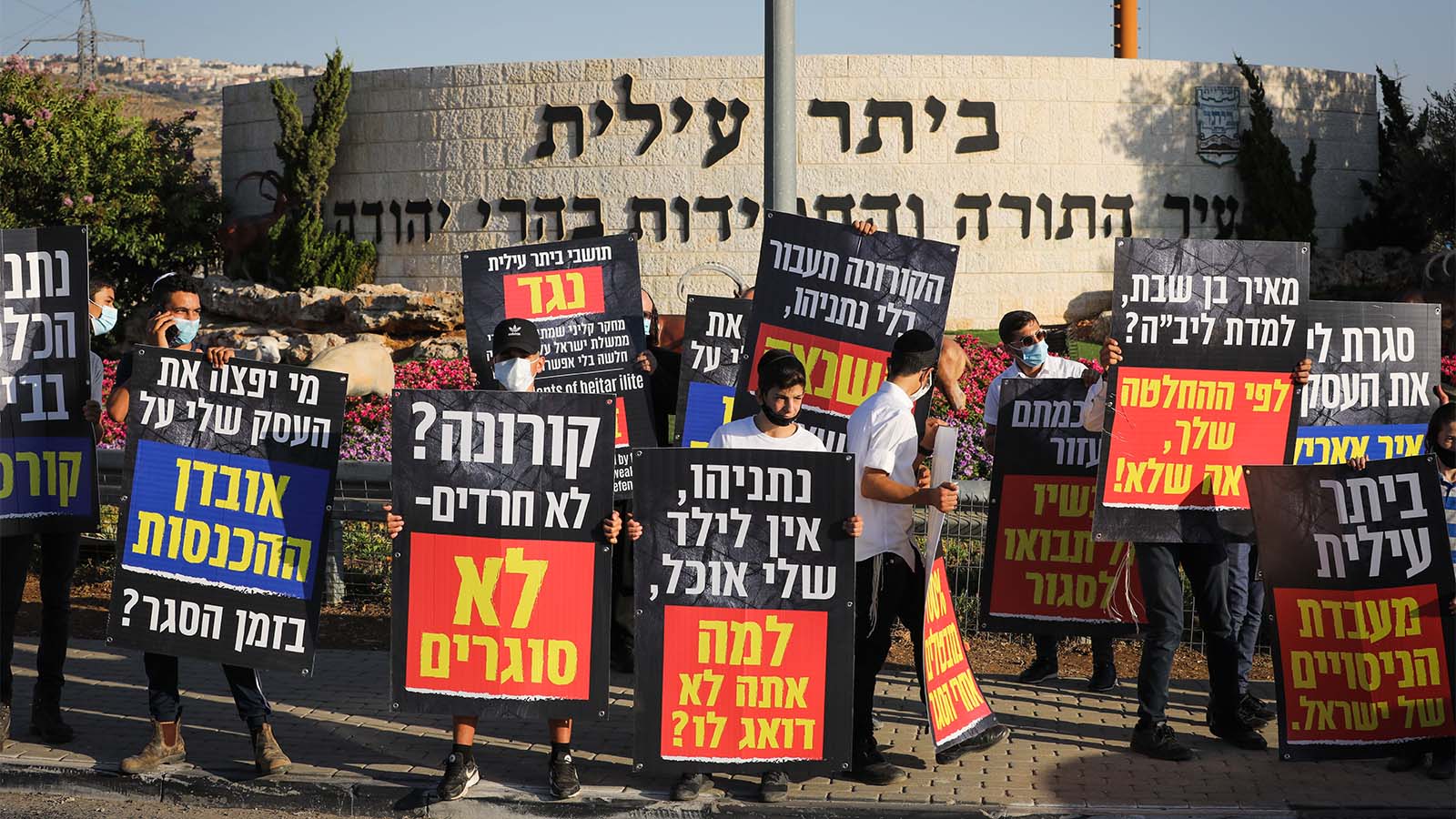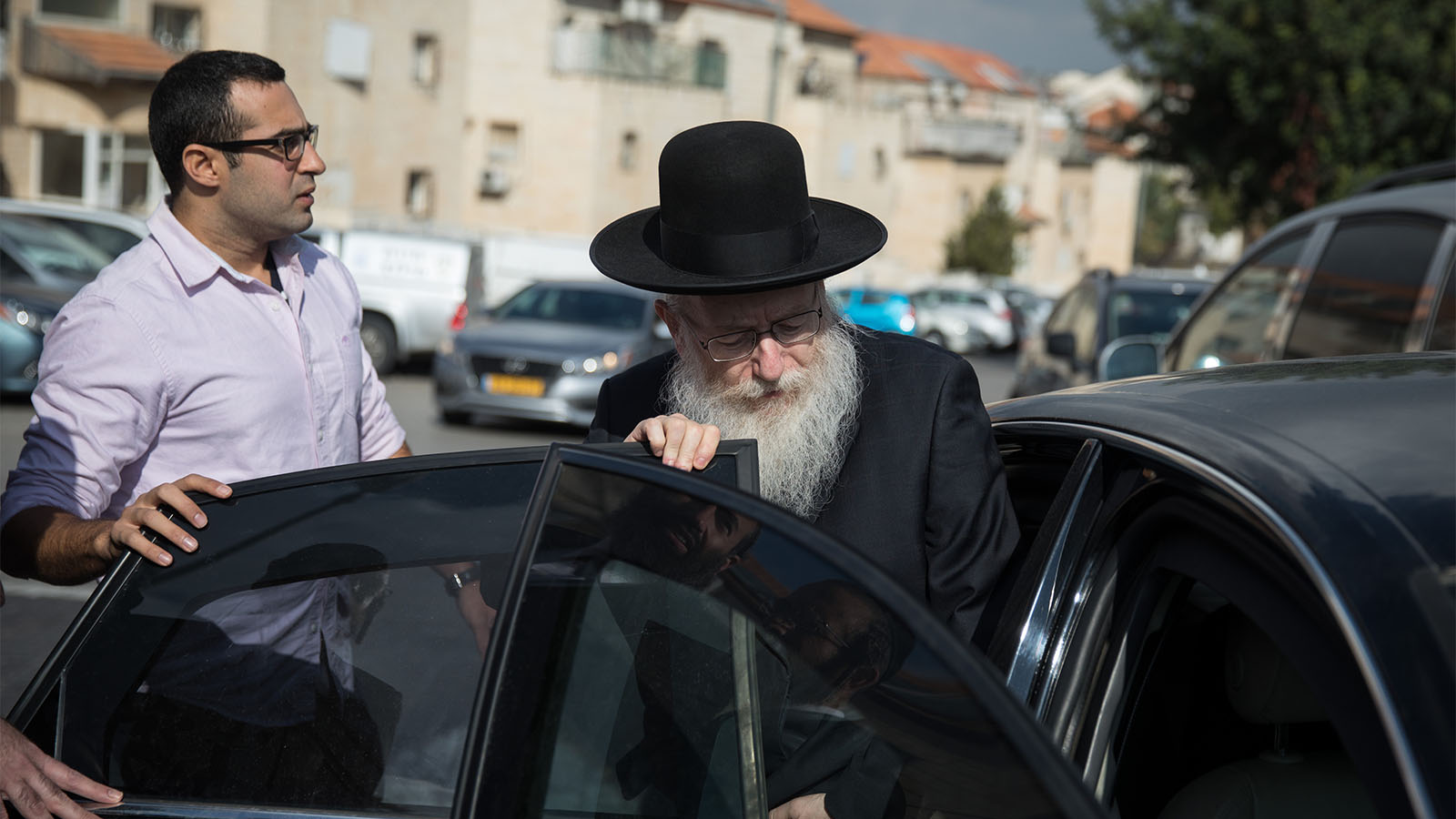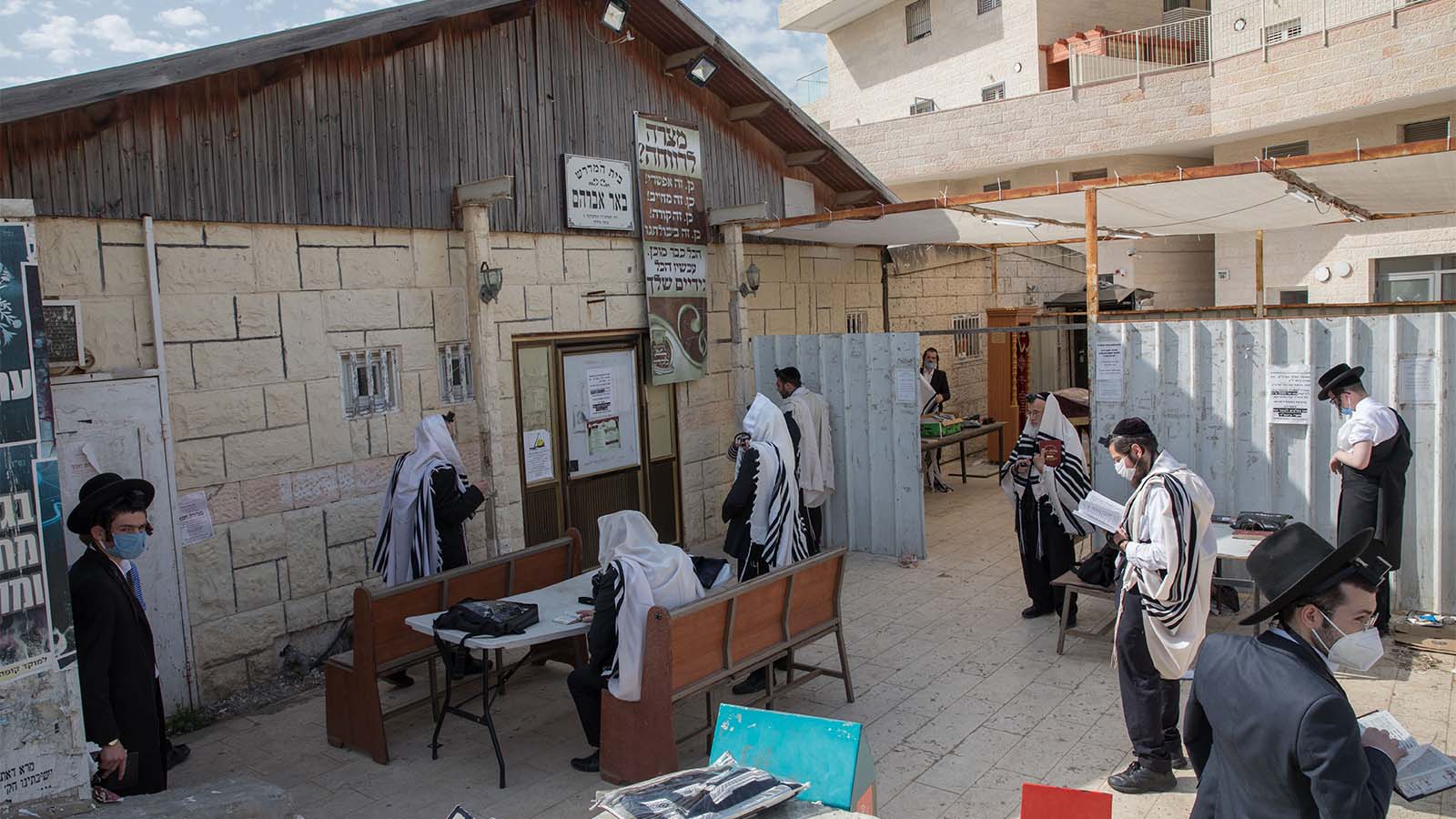
Despite its high infection rates and red zone status in the “traffic light plan,” Beitar Illit is in open rebellion against the lockdown imposed over the High Holidays. The Haredi city, located outside of Jerusalem in the Gush Etzion settlement bloc in the West Bank, has a population of 60,000, who are less than enthusiastic about the strict new guidelines.
“It’s a wild west here,” says Chaim Gottlieb, resident of the city who works in high tech. He cites mounting frustration with the government’s inconsistent policies as the main reason for the refusals to comply.
In a symbolic act of defiance, Beitar Illit’s mayor Meir Rubinstein flew to Uman, Ukraine on Sunday, September 17, the day before Erev Rosh Hashanah. Many followers of the Breslov sect would traditionally travel as part of the Rosh Hashanah pilgrimage to visit the grave of Rabbi Nachman of Breslov, but will not be able to this year because of restrictions put in place by the Ukrainian government. Rubinstein flew at the height of the infection rates in the city, and at the moment when Beitar Illit was expected to enter a general lockdown. He called the intent to lock down the city “abuse.”

The news came out earlier this month that Beitar Illit was defying orders, having refused to close down schools despite the nation-wide closures. The bus stops, where students wearing traditional blue-gray uniforms and masks congregate, are about the only place where people wearing masks can be seen.
This revelation may have shocked the secular public, but it is hard to say that it has changed anything among the city's residents. Many institutions have remained open for the past six months, some even remaining open during the long lockdown during the spring. According to Gottlieb, Beitar Illit is one of the economically weakest of all the Haredi cities.
"The question is the question of the conduct of the state. No one denies that there is a global epidemic that has shaken up life in the country,” says Aryeh Ehrlich, city resident, editor of Mishpacha magazine and host of the radio program "Alitov and Ehrlich" on the B Network. "Our political situation is characterized by a lack of leadership over corona. And how does the government react to this? Cause harm to vulnerable populations and hopes that it will create positive media.”

The first demonstration in Beitar Illit against the corona directives was attended by no more than a hundred people. According to Gottlieb, the low response was because city residents had not yet felt the implications of the guidelines. But once they felt the lockdown itself, he explains, thousands came out and blocked the entire city center. Beitar Illit has never seen demonstrations of this magnitude.
“To lock down this city, you need a fleet of cops, not half a unit,” Gottlieb says. “Laws that cannot be enforced and do not make sense, are null and void."
"People who want to go out to see their rabbi, their family, will fight for it," says Benjamin Kirschenbaum, a resident of Beitar Illit, explaining the desire to celebrate Rosh Hashanah properly. "A demonstration is legal, so how can people be told not to go to their rabbi?”
"Closing people up in isolation is awful. Do you know what it does to a man? This exacerbates the situation,” Kirschenbaum adds. “There are horrible stories about older people who have been mentally and spiritually damaged. The soul is what is important here, before the body.”
Gottlieb's son celebrated his bar mitzvah on Thursday, the day before Erev Rosh Hashanah. The Saturday before, the family held a big event. Over 300 celebrants came to the bar mitzvah, despite gatherings of that size being expressly forbidden in red zones.
Israel Holtzman, who heads the central Shtiblach (place of prayer and Torah study) in a large neighborhood in the city, explains the process that the city has gone through from the first wave of corona till today, in its many different sects.

“During the first wave, the Hasidic rabbis, the Sephardi rabbis and the leaders of the Lithuanian community said that caution should be exercised. Only the fringes of the Chasidim opposed the restrictions,” Holtzman says. “Slowly, more and more rabbis began to cast doubts. Among the Ger Hasidim, who are associated with Minister Yaakov Litzman who resigned this week, they are still very careful, but even there they realized that something isn’t right.”
Gottlieb, Holtzman and Shmuel Frisand sit outside the Shtiblach, from which men come in and out to pray, most without masks. The Shtiblach is open from six in the morning until night, and about 800 people pass through it every day.
"In the first wave, we built tents outside, we tried to pray with space between us and reduced the numbers, no more than ten worshipers in each room," says Frisand. “But at the command of the police we dismantled it, when prayers were forbidden in synagogues. After a month, little by little, we started to go back to normal, and it’s been that way until now.”
Holtzman explained that a large part of the resistance comes from distrust in the state’s leadership, and the feeling of being targeted. A breaking point came after the spat between coronavirus czar Roni Gamzu and prominent Haredi leader Rabbi Chaim Kanievsky over enforcement of corona testing and quarantine in yeshivas. Kanievsky ordered his followers not to get tested if they are not showing COVID-19 symptoms to prevent absentees from Torah studies.
“"As soon as Gamzu offended Rabbi Chaim Kanievsky, he outraged the entire Haredi public, who said, 'we’ve had enough of this.’ Every decision that Gamzu and Netanyahu make are human decisions. They too are afraid of an investigatory committee that could be set up later,” says Holtzman. “Gamzu is a respected man who was trusted, but as soon as he gets the microphone, he changes his skin. Why? Because he is led. There are politicians, there is the media, and he is a man.”
He explained that this leadership contrasts with the internal leadership the rabbis, or Tzadikim, provide within the Haredi community.
“In the rabbinical public, no one is going to set up an investigatory committee, and no one is going to jail. What the Tzadik decides is what he decides,” Holtzman continues. “It should be understood, our Tzadikim are always experiencing this whole situation. When a hundred people feel unwell, they all turn directly to the Belz Rebbe, who has to make decisions under circumstances of deep physical and mental pain. It is an ungraspable spiritual responsibility. Then people from outside and the media come in and disrespect him.”

At one point, a follower of the Beit Aharon Chasidim finishes praying and also joins the conversation. He emphatically explains that the Haredi public should separate from the state because the secular public will never understand them, so there is no point to try and convince them.
“The public here is Haredi, not fanatical. There is a full partnership with the state, but what is happening here is that they are acting illogically,” Holtzman responds.
Ehrlich, who prays daily at the Shtiblach, feels the great frustration that has been accumulating in his community for a long time.

“A month and a half ago, they decided to lock down Beitar, it was a complete joke. There was no actual change. They closed it down just to say that there is a closure,” he says. “Only on the last day did they decide to build a checkpoint and create a 3-kilometer traffic jam inside the city for people who wanted to go to work."
Ehrlich maintained that he is concerned about rising infection rates in the city, but feels that the Haredim are being blamed disproportionately.
“I'm not saying there are no problems in the sector, these things are done for objective reasons. It’s a population that lives in overcrowding, large families, a communal way of life that is characterized by congregations, events and synagogues. It is the fabric of our lives,” he says.
“But what's going on in pubs? In banquet halls? The Haredi are no different from the secular in this respect. We're all humans. By the way, the first significant outbreak event after returning to routine in the spring, happened at the Gymnasium High School in Jerusalem. What happened then? Everyone said, 'they had a party because they wanted to celebrate and let loose', so we can understand them straight away. But here it is immediately: 'Haredim!' 'It's irresponsible!' Etc. etc.’”
Holtzman added his perspective on the tensions between the secular and Haredi populations.
'This tension is only in those in authority positions. Between me and the secular doctor at Hadassah, there is only respect. In my opinion, there is no real confrontation between the secular and Haredi public,” he says. “Ultimately, every politician looks out for his seat, and is led by stakeholders. So if there's a secular person I'm supposed to have a problem with, there's probably politics that is influencing both of us.”






